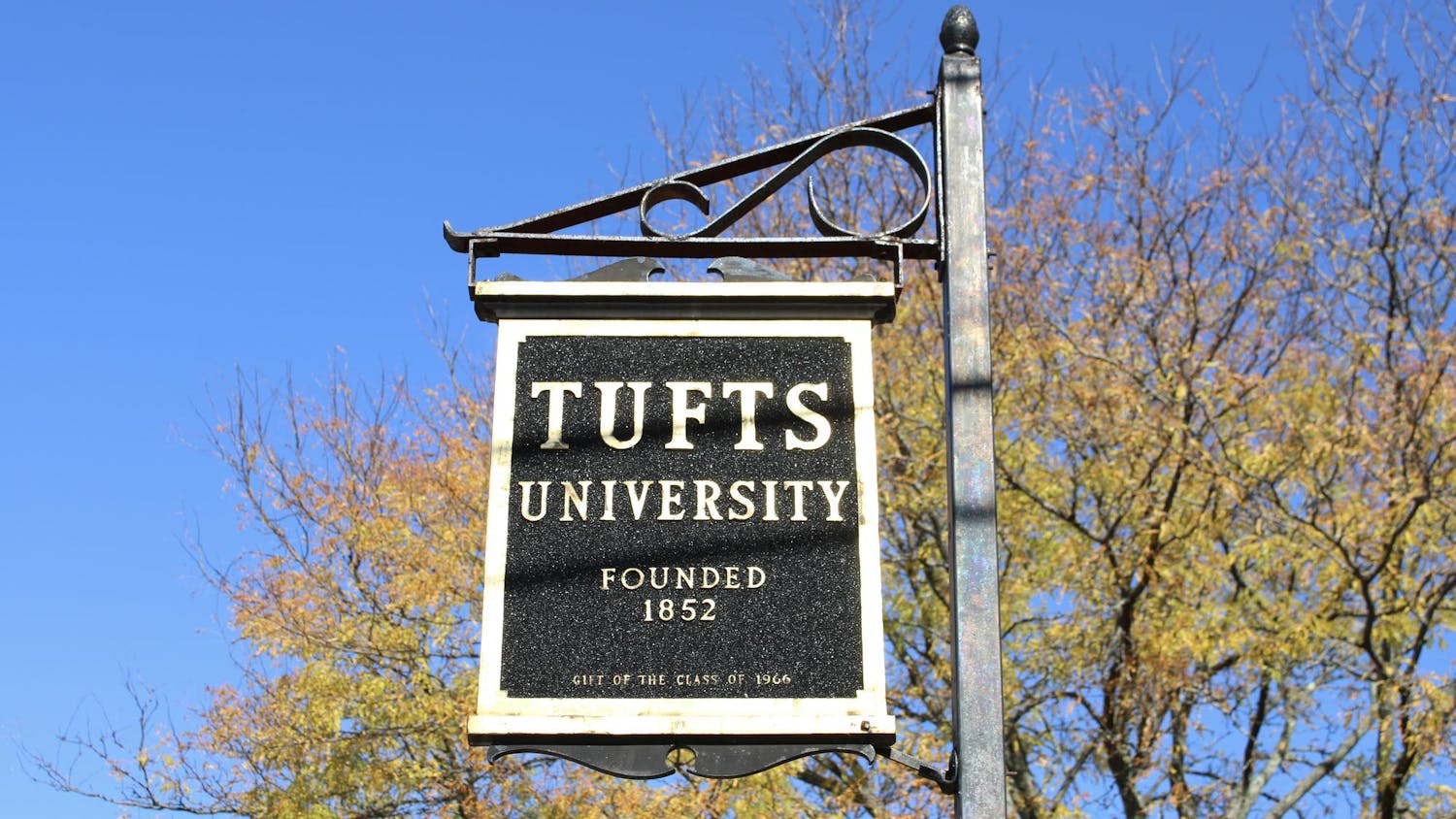Murder, in any democracy’s foreign policy, is hardly ever sold as murder. Instead, it is neatly repackaged, advertised as necessary defense to loyal constituents. On Nov. 10, the Fletcher School and Tufts Hillel will host one of the primary architects of this summer’s massacres in Gaza. Even before these massacres began, they had been neatly repackaged, the violence masked with the label of necessity.
Tufts Hillel describes Lt. Col. Dr. Eran Shamir-Borer as the "Israeli Defense Forces’ (IDF) legal advisor for Operation Protective Edge.” This latest assault on Gaza killed 2,127 Palestinians by the IDF’s count and was third in what has become a nearly biannual series of massacres. To put this in human terms, children six-or-older in Gaza have survived three major Israeli assaults in their short lifespans. But Shamir-Borer is not here to talk in any terms as honest as murder, massacre or assault. He is coming to address “the challenges facing Western democracies in the face of asymmetrical warfare.” Language is a powerful legitimizing weapon, and already there are five suspicious terms to unpack: Israeli Defense Forces, Operation Protective Edge, asymmetrical warfare, democracies and of course body counts, which speak a language purposely devoid of the true cost of war.
These euphemisms of the Israeli-Palestinian “conflict” were designed to make violent domination digestible to those whose political leaders, tax dollars and indifference uphold it. We in the United States are a primary audience. The United States donates one quarter of its foreign aid budget to Israel, and more importantly, provides crucial military equipment and the often lone diplomatic backing for an Israeli government that finds itself increasingly isolated in the international moral landscape.
As Tufts students, we are participants in the continuing violence in Gaza. From paying sales tax to allowing authorizers of mass murder to be invited to our campus, we need to think critically through the fog of rhetoric that grants Israel and the United States impunity for their crimes. The dominant and legitimizing narrative we are fed blames thousand-year-old Palestinian villages for standing in the way of Israel's "peaceful" settler colonial project. Ostensibly, Palestinian suicide homes crash themselves into peaceful Israeli bulldozers. Ostensibly, Gazans brought their deaths upon themselves at the hands of the peace-seeking IDF. In dominant discourse, Israeli violence is disappeared.
The constant presumption of Palestinian fault and Israeli victimization is reinforced by U.S. politicians: This summer while Israeli forces relentlessly pummeled the imprisoned population of Gaza, our lawmakers produced dozens upon dozens of statements and bills speaking of Israel’s “right to self-defense,” Hamas’ “human shields” and “unprovoked rocket attacks from the Hamas terrorist organization.” Congress authorized an additional $225 million of aid for Israel’s Iron Dome in early August, and after its passage, House Speaker John Boehner reiterated the apparently still unchallenged logic that “Israel is our friend and Israel’s enemies are our enemies.” U.S. politics, too, work to disappear Israeli violence.
To unveil this violence, it is necessary to unpack Shamir-Borer and Tufts Hillel’s euphemisms. The entire conception of the Israeli military is designed to distort the inherent offensive nature of a settler-colonial state, because after all it’s the Israeli “Defense” Forces. The cry of “self-defense” emanates regularly from the U.S. Congress and the Israeli Knesset, despite that from 2000 to 2013 the cycle of killing was reignited by Israeli forces 79 percent of the time, in contrast to the eight percent of cases in which Palestinians killed Israelis first, according to Israeli human rights organization B’Tselem’s count.
Operation Protective Edge bears the same deceptive “defensive” branding. The notion of “asymmetrical warfare,” to use Shamir-Borer’s speech description, are inverted to justify offensive violence. As Max Blumenthal concluded as part of his investigative report on the “disinformation campaign” waged by authorities, “the Israeli government, intelligence services and army engaged in a cover-up to provide themselves with the political space they required for a military campaign.” IDF propaganda this past summer whipped up a frenzy over the fear that Hamas rockets threaten the majority of Israel’s population. The propaganda conveniently omitted that “compared to what the Israelis are using, the Palestinians are firing bottle rockets,” in the words of “a counter-intelligence veteran of the U.S. CIA who spent his career monitoring Israeli and Palestinian military capabilities.” And yet, in July, Prime Minister Benjamin Netanyahu described the threat of “these projectiles of death” as comparable only to the threat to“Britain during World War II.” This is not to defend Hamas’ bloodthirsty, condemnable rocket fire, but to contextualize it within a larger power dynamic. State terror has radicalized some among a strategically impoverished and constantly besieged population. Locked away within the open air prison that is Gaza, Hamas' violence does more harm to its fellow prisoners than its jailers.
Shamir-Borer and his allies also attempt to claim the military moral high ground by labeling Israel and the United States as threatened “democracies.” But Israel’s claim to democratic status is weak, and the country’s democratic failings are tied to the oppression that breeds Hamas’ radicalism. For a state that claims to be both Jewish and democratic, the former adjective has eclipsed the latter, systemically privileging Jews over Arabs and White (Ashkenazi) Jews over others. The illegal 47-year military occupation of the West Bank and the seven-year military blockade of Gaza are the cornerstones of unequal power. But structural discrimination functions in myriad other ways including over 50 discriminatory laws, separate and unequal legal standards, a segregated road system, housing segregation and most recently, bus segregation. As Israeli political geographer Oren Yiftachel argues, Israel can better be understood as an “ethnocracy,” meaning a regime promoting “the expansion of the dominant group in contested territory … while maintaining a democratic facade.”
It is crucial to interrogate one final framing of the violence: the language of body counts. The Israeli state’s settler-colonial project victimizes people at many levels. Four-hundred ninety-five Palestinian children fell victim to Israeli bombs. Six Israeli civilians fell victim to Hamas rockets. Several hundred Hamas militants died fighting, an act they probably saw as the only viable Palestinian resistance. Sixty-six Israeli soldiers, mostly young men conscripted into a settler colonial fighting force, died fighting. But numbers do not begin to capture the agony of destroyed homes, of children returning to gutted schools, of families who disappeared in a heartbeat, of relatives’ hearts sinking from unanswered phone calls, of the agony of a people who were slated for liquidation long ago and whose every living moment is an act of resistance. Suheir Hammad described the pain of her fellow Palestinians as “grief upon grief astronomical.”
My own experiences do not allow me to comprehend this agony, but I can insist that our community take seriously our complicity in the violence that remains legible. We must be vigilant of euphemisms around Palestine, and around every other political issue, because their confounding power veils most of the violence we uphold. The euphemisms of U.S. political discourse were designed to assimilate increasing inequality into our supposed modern meritocracy. The euphemisms of Tufts were designed to mask violence close to home. On our campus, rape and sexual assault are neatly packaged as “sexual misconduct,” racist remarks become “bias incidents” and sometimes less-than-thoughtful community engagement is congratulated as “active citizenship.” Rejecting euphemisms means holding ourselves accountable to all the violence hiding behind everyday discourse.
Shamir-Borer does not deserve a platform. He deserves a trial. One way you can reverse your complicity is by challenging his presence. Tufts Students for Justice in Palestine is calling on University President Anthony Monaco to cancel Shamir-Borer’s speaking engagement so that apologists for Israeli war crimes are not honored on our campus. To stand with our values of refusing euphemisms and unmasking violence, please sign on to our letter to President Monaco.
More from The Tufts Daily





